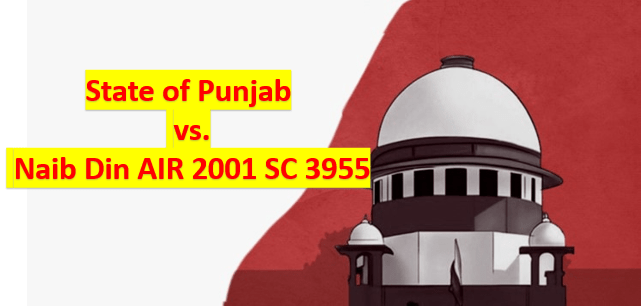
State of Punjab vs. Naib Din AIR 2001 SC 3955
DATE OF THE CASE: 28/09/2001
APPELLANT: STATE OF PUNJAB
RESPONDENT: NAIB DIN
BENCH/JUDGES: K.T. Thomas & S.N. Variava
LEGAL PROVISIONS: Section 9 of the Opium Act, Section 313 Cr. P. C, Section 296 Cr. P. C, Section 313 Cr. P. C.
FACTS OF THE CASE
- In a criminal trial, a police officer’s testimony was presented by affidavit, but the High Court rejected it, which led to the dismissal of the whole prosecution case. As a result, the conviction and sentence given on the accused were overturned solely on that basis. By special leave, the State of Punjab appeals the aforementioned High Court ruling.
- The police filed a charge sheet against the defendant before the Court of a Judicial Magistrate of First Class in Ludhiana for the offence under Section 9 of the Opium Act. The trial magistrate ruled that the prosecution’s evidence was sufficient to find him guilty of the offence under Section 9 of the Opium Act.
- As a result, he was given the aforementioned conviction and imprisonment. The sessions court rejected his appeal after upholding the verdict and punishment.
- Before the High Court of Punjab and Haryana, the respondent submitted a revision. The learned single judge who ruled to alter did not deem it necessary to get into the specifics of the case.
ISSUE RAISED
Learned Single judge of High court overlooked the formal nature of the evidence and ruled out the judgement of the lower courts as in this case police arrested the accused with the opium but the accused alleged that police is actually making a false case against him. So, the Supreme Court needs to look whether the High court decision was correct or it needs to be turned and police evidence of finding opium from the person will be considered or not?
CONTENTION OF THE PETITIONER
The main accusation against the man was that on November 11, 1884, the man was discovered to be in possession of 4.5 kg of opium that had been wrapped in glazed papers. According to the police, the respondent was discovered by some police officers who were returning from patrol duty near the railway crossing in Kanod Village (Sanhewal, Ludhiana district). He attempted to flee the area after seeing the police, but the officers became suspicious of him and caught up with him. Police could take the illegal substance (Opium) from him during a search. Ten grams of opium were separated by police officers as a sample and placed in a matchbox before being sealed. The material was sent to the Chemical Examiner, who confirmed it was opium after examining it. The police filed a charge sheet against the respondent when the inquiry was finished.
CONTENTION BY DEFENCE
Respondent was questioned under Section 313 of the Code of Criminal Procedure, the defendant claims that the police falsely created the current case against him in order to discipline him. He added that he was kidnapped from his home early on the morning of November 11, 1984, brought to the police station, and given the case.
JUDGEMENT
The Supreme Court believes that the learned Single judge’s position was too stilted to be accepted. In any case, acquitting the prisoner without giving the prosecution a chance to correct the error (if there was one) simply led to a miscarriage of justice.
The Supreme Court ruled that the facts stated in the affidavit were purely of a formal character. At any rate, even the defence could not dispute that aspect because no request or motion was made on behalf of the accused to summon the deponents of those affidavits to be examined in Court. In such a situation it was quite improper that the High Court used such a premise for setting aside the conviction and sentence passed on the respondent, that too in revisional proceedings.
Respondent was examined under Section 313 of the code, but he was unable to demonstrate any injustice resulting from the refusal to ask a question about such formal evidence. No protest was made in the trial court due to such an omission. The appellate court did not address any such ground. Even if the trial court omitted to ask an accused a question of a crucial nature, an appeal court or revisional court should not automatically set aside the conviction and sentence as a result of this error.
The revisional court shouldn’t typically worry about such an objection If it wasn’t presented at the appellate level. In any case, the failure to raise the issue of simply formal evidence is inadequate to support the conclusion that the proceedings were invalid. Without a doubt, the affidavits in this case are merely intended to advance official evidence.
For the aforementioned grounds, the Supreme Court upheld the appeal and invalidated the High Court’s challenged judgement. After providing both sides with a reasonable opportunity for a hearing, the Supreme Court dismissed the revision that the respondent had filed with the High Court for further consideration.
CONCLUSION
In the present case the Supreme Court dismissed the order of the High Court and allowed the appeal of the State of Punjab after reviewing the case laws related to it and considering that the evidence was of formal nature and in lower courts that person doesn’t raise the question that the crucial point of the accused is not considered.
This judgement is a light for the police investigation under which police can do their work but it also put a constraint that every point of the accused needs to be considered during the hearing before the courts and also it can be stated from the judgement that High Courts should hear the case in a proper manner as only overviewing the case is not enough for giving the verdict.
written by Shivanshu Shivam intern under legal vidhiya




0 Comments